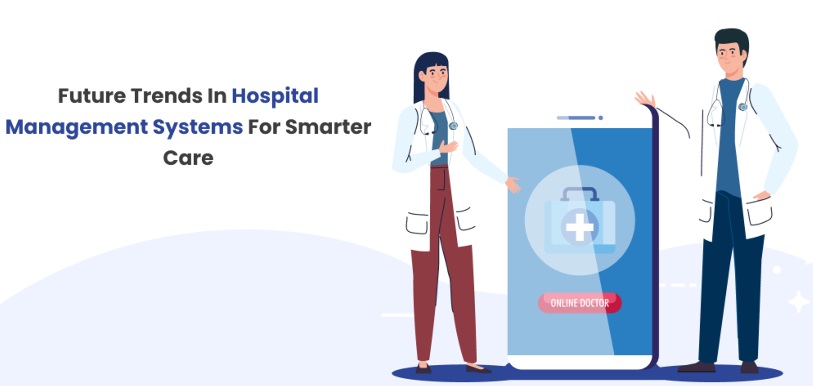
The trend of digital transformation is sweeping widely across, and leading this revolution in healthcare is what is generally known as a Hospital Management System A hospital management system changes the way a hospital works its ways for looking towards smarter care increasing efficiency and thus satisfaction towards its patients. Here are some key trends that shape the development of the Hospital Management Systems of the future.
Rise of AI-Powered Hospital Management Systems
Artificial Intelligence plays an important role in the contemporary Hospital Management System. AI-based tools are integrated into the different modules of the Hospital Management System for conducting regular functions of patient scheduling, billing, and inventory management. These improvements lessen human mistakes and allow the smooth performance at the hospitals. For example, the AI-powered Hospital Queue Management Systems ensure a smooth inflow of patients and reduce waiting time.

Cloud-Based Hospital Management System
A cloud-based hospital management system is an advanced solution for managing hospital operations but simultaneously optimizing accessibility, security, and effectiveness. Contrary to local servers where the traditional systems are kept, a cloud-based system utilizes a cloud to store data centrally for easy access and scalability.
Features of Cloud-Based Hospital Management Systems
Central Access to Data: The facility provider can access the client’s records, schedules of appointments, and billing at any time and place and, thus becomes efficient in operation
Improve Security: Data is encrypted in the Cloud systems. Thus, following the international health care standards like HIPAA, patient sensitive information cannot be retrieved by an unauthentic source.
Scalability: Starting with a small clinic up to an entire network of hospital, this solution in cloud could scale to the needs of the organization.
Operational cost efficiency: No expensive hardware or maintenance is required to run the system, thus making it a very cost-effective system operation-wise.
Integration: The modules supported integration with laboratory, pharmacy, and radiology modules, thus providing a common platform for the management of health operations.
Benefits of cloud-based health care
A cloud-based hospital management system has many transformative benefits to health care providers. There is optimization of workflow that can be done using live updates and automation; in fact, hospital queue management systems reduce the waiting period of patients. With such a cloud-based system, telemedicine can also be added, where patients reach the doctors from any location just by consulting them online.
Cloud-based hospital management systems of countries like India are increasingly taking their solutions to the cloud, making health care accessible to the rural and urban populace. These also support disaster recovery, thus never losing data even during emergencies.
The cloud-based hospital management systems are not just technological upgrade but the future of patient-centric care offering speed, flexibility, and reliability within a fast-changing landscape of health care.
Interoperability and Integration
It follows, therefore, that the current modern hospital management system offers interoperability, allowing its smooth integration with other systems or health care devices. For example, EHRs and diagnosis tools, as well as telemedicine, can be incorporated in a hospital management system. Interoperability, which comes with increased adoption of digital health in India, ensures that the Hospital Management Software In India meets most healthcare needs.
Patient-centric care
The patient-centric care approach is what drives the innovating of the Hospital Management System in health care. The most recent features include the creation of portals for patient appointment booking and real-time communication tools. This tool helps the patient to be more participative in the journey of health care treatment. Greater trust and satisfaction are achieved. The accessibility of patients toward their medical records, scheduling, and communication with healthcare providers is easy on online platforms through the hospital management system.
Improved Analytics in Hospital Management Systems
Advanced analytics is the bedrock of the future for the Hospital Management System. Analytics provide meaningful insight into patient outcomes, operational efficiencies, and the financial performances of hospitals. The analysis of data collected from different modules of the hospital management system will enable hospitals to trace patterns and predict the needs of the patients based on which they will take decisions. This trend especially holds importance for Hospital Management Software in India, since the optimization of resources is pretty much crucial there.
Mobile-Friendly Hospital Management Systems
Mobile access has now become the backbone for any modern Hospital Management System. Increased use of smartphones has slowly but surely shifted the demands of healthcare professionals and patients to mobile access of solutions. Whether it is a clinic management system or an integrated HMS, there is better communication, quicker updates, and decision-making in real time with mobile access.
Cybersecurity in Hospital Management Systems
It would mean very sensitive patient data which is necessary to guard securely because of using more digital tools in a hospital. Hospital Management System for the Future will focus more about incorporating cybersecurity solutions including encryption, multi-factor authentication and real-time monitoring of threats. Demand in Indian market has gained pretty good momentum considering compliance-based issues with Data Protection acts.
IoT Integration growth
IoT will transform the Hospital Management System. The modules of the hospital management system will be embedded with IoT devices like smart beds, wearable health trackers, and connected diagnostic tools. In this manner, integration will ensure real-time monitoring, effective resource utilization, and better care for patients.
Regional Trends: Hospital Management Systems in India
With the upsurge of healthcare, the Government has also offered many initiatives to promote the Hospital Management System Software rapidly in the country. Several of these hospitals opt for online solution facilitation to assure smooth operation and care of the patients with ease. Two other reasons for the increased popularity of Hospital Management Software In India are its affordability factor and its ability to meet the unique requirements of the Indian health care institutions.
Conclusion
The future for the Hospital Management Systems will surely be bright, especially with the integration of AI, IoT, and cloud computing. However, all this is not just any technology but is part of the other thing-that is, a smart way of healthcare delivery. Be it a clinic management system or an advanced hospital queue management system, the focus will be on better efficacy, cost reductions, and more or less patient-oriented care. With the trend getting more improvised with time, global and Indian healthcare are all set to reap a windfall gain from such emerging trends.
Author Profile

- Gaurav Kanabar serves as the Chief Technologist for Digital Content and Platforms at Luckymatrix. Alongside his role at Luckymatrix, Gaurav is CEO of Alphanso Technology, an India-based web and app development company developing an Event management system in PHP and open-source streaming software for helping entrepreneurs, independent artists, and more.
Latest entries
 Digital MarketingApril 8, 2025Manage your website smartly with VPS Servers in Germany
Digital MarketingApril 8, 2025Manage your website smartly with VPS Servers in Germany SoftwareApril 3, 2025Maximize Your Efficiency & Save Time With Free Invoice Software
SoftwareApril 3, 2025Maximize Your Efficiency & Save Time With Free Invoice Software Digital MarketingApril 3, 2025Why Social Media Platforms Benefit from File Upload Features
Digital MarketingApril 3, 2025Why Social Media Platforms Benefit from File Upload Features Digital MarketingApril 3, 2025Top 10 Best Video Animation Companies in Dubai, UAE
Digital MarketingApril 3, 2025Top 10 Best Video Animation Companies in Dubai, UAE